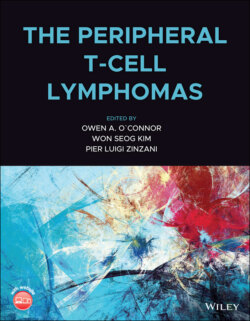Читать книгу The Peripheral T-Cell Lymphomas - Группа авторов - Страница 25
Cell‐cycle Control
ОглавлениеTP53, the gene that encodes for p53, the guardian of the genome, is probably the most studied tumor suppressor gene. P53 regulates multiple cellular functions, such as DNA repair, cell‐cycle arrest, apoptosis, senescence, and metabolism. TP53 mutations or deletions are found in around 50% of cancers, and commonly correlate with chemoresistance and poor prognosis. Inactivating TP53 mutations are reported with a variable frequency, being uncommon in Tfh‐derived PTCL, and more frequent in PTCL‐NOS. In particular, a PTCL‐NOS subset characterized by genomic instability and a poorer prognosis, partially overlapping with the GATA3–3‐positive molecular subgroup [6] is enriched in TP53 anomalies [6, 53]. In ATLL, TP53 mutations are found in less than 20% of the patients, where they associate with chemoresistance and short survival [46]. They are also common in extranodal PTCL, such as ENKTL [25] and enteropathy‐associated T‐cell lymphoma (EATL) [54].
In addition to TP53 inactivation, CDKN2A deletions have also been reported in several PTCLs. CDKN2A, located on chromosome 9, encodes for two transcripts, p16INK4a and p14ARF. p16INK4a is involved in cell‐cycle regulation, via inhibition of cdk4 and cdk6, resulting in activation of retinoblastoma proteins, while p14arf controls MDM2 activity via sequestration. MDM2 is an E3 ubiquitin ligase that recognizes the N‐terminal transactivation domain of the p53 tumor suppressor, resulting in its degradation. Thus, CDKN2A deletion can result in increased MDM2 function and excessive p53 degradation. CDKN2A deletions are frequent in CTCL, especially in aggressive forms, as they are observed in more than 50% of patients in transformed mycosis fungoides or Sézary syndrome, while they are rare in CD30+ cutaneous ALCL [55]. In ATLL, CDKN2A deletions are reported in 50% of patients with the acute form, but in only 20% of patients with chronic clinical variants of the disease [56]. Deletion of CDKN2A, found in up to 50% of patients with PTCL‐NOS with enrichment in GATA3/Th2 signature, is reported to correlate with shorter survival and poor prognosis [6, 53].
TP63 is rearranged in a small proportion (< 10%) of ALCL, where it correlates with intense P63 expression [2]. Although TP63 is a TP53 homolog, its role as a tumor suppressor gene is unclear. However, cases with TP63 rearrangement correlate with an aggressive clinical behavior [2, 57].
